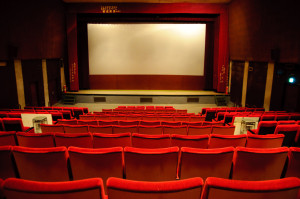
Billions of dollars are at stake in the quest to provide the best movie going experience—excluding massive revenues from concessions and DVD sales, in 2015 alone Americans spent over $11.7 billion on movie tickets. The Screening Room, one of the newest and hottest Hollywood start-ups, has the potential to usurp the quintessential profit-making aspects of the film industry. At its core, The Screening Room is the latest, and possibly most significant, mechanism with the potential to bring everything movie theatres have to offer (besides the $10 jumbo-size tub of overly salted popcorn) directly into consumers’ living rooms. A movie streaming service, The Screening Room requires customers to purchase a $150 living-room device that can be used to rent mass-appeal movies for 48-hours for $50 each the same day they premiere in theatres.
With the potential to rival the appeal of Spotify, if it was up to consumers, The Screening Room would be coming soon to a television near you. However, the motion picture studios, exhibitors, and some major directors, including James Cameron and Brett Ratner, want to halt production before it even gets off the ground. As reported by the New York Times, there is widespread trepidation amongst industry investors because “[i]f consumers could immediately see new big-budget movies at home…why would large numbers of people haul their families to a multiplex and, more important[ly], spend a fortune on concessions?” With respect to studios, while they readily welcome almost anything to help curtail their often staggering marketing costs, devices such as The Screening Room may potentially “cannibaliz[e] a still-huge DVD business” and anger theatre owners.
One of the other worrisome factors is The Screening Room’s source. One half of the team that conceptualized the idea is Sean Parker, the founder of notorious music sharing website Napster. The widespread use of Napster in the early 2000’s spurred widespread pirating of music, thereby completely obliterating the longstanding means through which the music industry profited. Justifiably, the film industry is reluctant to embrace anything that could have the same effect on its revenue-earning streams and The Screening Room has the potential to do just that. Previously offered services similar to The Screening Room have proven catastrophic and encountered fierce resistance. Already, Regal Entertainment Group, the National Association of Theater Owners, and the Art House Convergence have “seriously question[ed] the economics of the proposed revenue-sharing model” and have publicly voiced their strong opposition. Criticism of The Screening Room has also spread across the Atlantic as two European groups, the International Union of Cinemas and the U.K. Cinema Association, have issued chilling statements condemning Parker’s project.
While Hollywood knows that the traditional movie theatre experience will not remain stoic as technology continues to progress, “the old-fashioned communal theater experience remains extremely powerful, both culturally — Would ‘Star Wars’ be ‘Star Wars’ without the midnight lines at the multiplex? — and as a business.”
Loren Shokes is an Entertainment and Sports Highlight Contributor for the Harvard Journal of Sports and Entertainment Law and a current second year student at Harvard Law School (Class of 2017).
